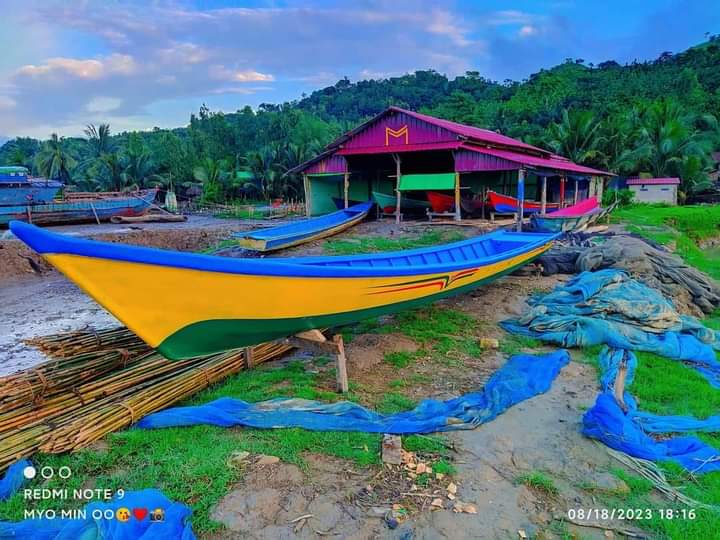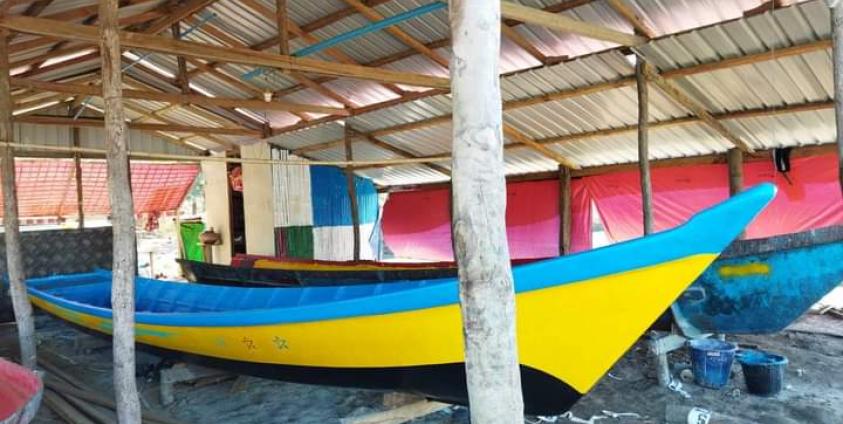The Rakhine fiber boat industry is encountering manufacturing challenges and potential business shutdown due to shortages in raw materials used for boat production, coupled with soaring prices, according to entrepreneurs.
Entrepreneurs in the Rakhine fiber boat industry are sourcing raw materials from Myawaddy Township on the Thailand-Myanmar border through Yangon. However, this month has witnessed a substantial shortage of these materials, causing prices to escalate significantly, according to the entrepreneurs.
U Maung Than Myint, a fiber boat entrepreneur from Tha Yet Taung Village in Myebon Township, mentioned that the recent damage to the Myawaddy-Kawkareik segment of the Asia Highway has disrupted the import of raw materials into the country. Consequently, the prices of the remaining goods ordered through Yangon have experienced a substantial surge.
"In the current circumstances, we find ourselves unable to purchase materials. Currently, we are obtaining materials from foreign sources through Yangon. Since these goods are imported, their prices have surged significantly following the disruption of the Asia Highway segment," he explained.
In the entirety of Myebon Township, there are approximately seven fiber boat industries. Since 2017, these industries have primarily focused on the production and sale of boats for the local water industry.
 Fiber boat production involves the utilization of 13 diverse raw materials, such as resin, mat roll, hardener, monomer thinner, rock powder, and wax. The costs of these materials are on a rapid exponential rise.
Fiber boat production involves the utilization of 13 diverse raw materials, such as resin, mat roll, hardener, monomer thinner, rock powder, and wax. The costs of these materials are on a rapid exponential rise.
Among them, the cost of one barrel of resin, which constitutes the initial raw material for molding fiber boats, has risen from 1.7 million kyats in July to over 2.2 million kyats in August. Additionally, a roll of Mat 450, among these materials, has increased from 170,000 kyats last month to over 200,000 kyats currently.
Because the cost of materials is high, selling boats at a good price in the area isn't possible. Ko Zaw Min Oo, who runs a business making M fiber boats in Tha Win Sae Kay village, Myebon township, mentioned that if they run out of materials, they might have to stop their business.
"At the moment, producing four or five boats per month has become challenging due to the rising costs of raw materials. I can now only manage three or four boats, working with the materials I currently have available. There's a possibility that we might need to halt production once our existing materials are exhausted," he explained.
At the moment, fiber boats are being sold at prices like 2.6 million kyats for a 30-foot long boat and 1.8 million kyats for a 25-foot boat. These boats are primarily bought by local water industries, according to the entrepreneurs.
"Because we can't buy materials now and their prices are really high, we're telling buyers about this and raising our prices a bit when we sell boats. But if material prices keep going up, we won't be able to raise the prices anymore. Some other businesses around here are also thinking about stopping," explained Ko Zaw Min Oo, the owner of M Fiber Boats.
Fiber boats are widely used in the Rakhine region because they last a long time and don't need as much maintenance as wooden boats. Instead of traditional carved wooden boats, people now prefer fiber boats. The main places producing these fiber boats are Mrauk-U, Minbya, and Myebon townships in Rakhine State.
On August 7, a segment of the Myawaddy-Kawkareik Asia Highway, situated near the Taw Naw waterfall, collapsed due to heavy rainfall and water runoff from the mountain. This incident resulted in the closure of the highway and the suspension of goods import.
As of August 25, the construction of the Bailey bridge on that particular stretch of the highway was finished. Consequently, the highway has been reopened, allowing both large and small vehicles to pass through.







